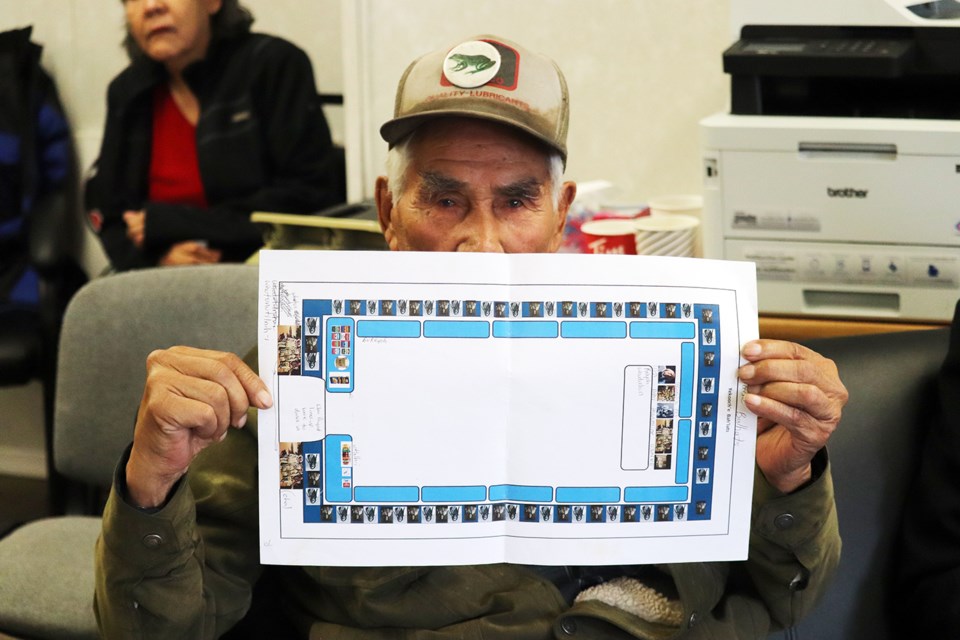Lheidli T’enneh will host its first Balhats (potlatch) in 73 years next month with the help of the knowledge of Elders from across the region.
More than 20 Indigenous Elders from communities in the region have gathered together for a special workshop to help train Lheidli Elders, council and staff to host the Balhats.
“What we are doing here today is learning all these different pieces of Balhats,” says Lheidli T’enneh Chief Clay Pountney.
“It’s new so that’s why we are learning from all of these Elders, but bringing back a system that was in place prior to colonialism is huge and seeing what that looks like is phenomenal.”
As part of an assimilation policy, the federal government banned potlatch from 1884 to 1951. Potlatch is a practice that is integral to the governing structure, culture and traditions of many First Nations including Dakelh peoples.
Lheidli will host its first Balhats since 1946 on Friday, Nov. 29. The last Balhats held in Lheidli T’enneh 73-years-ago was for the funeral of a member.
Elders from Saik’uz, Nazko, Yekooche, Nak’azdli and Tl’az’en attended the Oct. 30 workshop to share their experiences and stories with Lheidli about Balhats practices.
“I think the biggest thing here is the power of the wealth of knowledge in this room and having everyone come together from the five different Nations to talk about their experience,” says Pam Spooner, who is the director of Aboriginal Education at School District No. 57 (SD57) and is Gitxsan.
“As Gitxsan people, we practice potlatch all the time, I believe a lot of them practice as well, but bringing it back to the Lheidli territory is something we are learning all together to try and make it as powerful as possible.”
Spooner says the idea to bring back Balhats started with Vincent Joseph who works for Lheidli T'enneh, and suggested a meet-and-greet to have new teachers, principals, and staff welcomed to Lheildli territory be done in the Balhats system.
“It got bigger and bigger and so now the importance of getting the Elders knowledge of what they remember and what they practice in the Balhats system is huge,” says Spooner.
“You can see with the wealth of knowledge that the Elders hold here how important it is that the youth hear their voices, as well, and make that connection.”
Elder Francois Prince from Naka’azdli says he was excited and honoured to attend the workshop.
“Balhats refers to ‘coming together’ for a reason,” says Prince. “Because it was banned before, the whole governance system was banned at one time and now that we have it back a lot of parts are missing and not being passed down, so part of coming together in this way is to bring all that back.”
Lehidli T’enneh Elder Violet Bozoki says she thinks Potlatch stopped in Lheidli because it’s so close to Prince George, whereas other Nations were "way out in the bush."
“What I have learned is that they are all practicing their potlatch system and I’m glad they are here to help us to relearn our system,” says Bozoki. “I kind of know it, as I followed my grandfather in Stoney Creek and how they do the potlatch in Stoney Creek.”
The eldest Elder in the room, 92-year-old William Joseph from Yekooche brought a manual he wrote with Ruby Dominic-Prince called ‘Balhat governance system of the Carrier People of Stuart Lake’ to share with the elders.
Joseph says he’s very encouraged to see that all the Dakelh from the territories get back together and become stronger.
“That is the Balhats system here that is how they do it a long time ago when I was about eight or nine-years-old and that’s how I see it,” says Joseph about a map he has created illustrating a Balhats.
“Our language is similar and our potlatch is basically the same,” says Vincent Joseph, who works for Lheidli T'enneh, about the Nations gathered together.
“It might differ a little it means the same thing. It means respect and bringing people together. It means trusting one another and the most important part is it brings a culpability to the nations. That we are honest and truthful together.”



